The Left Hand had launched fresh fireflies immediately, but he wasn’t going to wait for them. He told the shuttle to follow them down, keeping just enough distance to be sure it could decelerate in time.
The new border lay some sixty kilometers down, but its altitude was no longer constant; the shuttle came to a halt in the middle of a sinuous valley. The borderlight around them revealed the striations they’d seen from afar to be just one level of structure: the bands were crossed with networks of fine, dark lines, super-imposed over shifting waves of increased luminosity. And this was just the naked-eye view of a ravaged landscape, exposed to the vacuum and thick with alien marauders. What the pristine depths contained on a xennometer scale, Tchicaya couldn’t begin to imagine, but between these macroscopic structures and the vendeks themselves, the opportunities for complex life were greater than ever.
While they waited for the stylus to realign itself, Mariama said, "Can I ask the toolkit something?"
Tchicaya nodded warily.
"How complex an algorithm could you inject into the far side?" she said.
The toolkit replied, "On what time scale? If you give me long enough, there are no limits."
"How long would it take to inject yourself?"
"Scribing all the data directly with the Left Hand? About a hundred thousand years."
Mariama laughed in infrared. "What about other ways of doing it? What’s the most efficient method that would be achievable with the hardware at our disposal?"
The toolkit fell silent, conducting an exhaustive search.
Tchicaya said, "What’s this about?"
"We’re blind up here," she replied. "All our time and effort is going into shuttling information back and forth across the border. Yann and the others have given you a lot of valuable knowledge, but the place where it needs to be applied is the far side."
The toolkit said, "I could scribe a series of graphs that would give rise to a far-side structure that would let me send data through the border as modulated light. That would take seventeen minutes. The total bandwidth would then be about one zettabyte per second. I could send myself through in a millisecond."
"In a form that could then travel deeper, away from the border?"
"Possibly. I could wrap the basic quantum processor in a shell of motile vendeks. It still might not be able to survive in every environment it encountered, but it could send out probes to explore its surroundings, and it could tweak the vendek populations in the protective shell as it moved."
"What about communications with the near side?" Mariama asked.
"I could try to maintain a shielded data cable back to the border, but the prospects for that look much poorer. The Planck worms are going to attack the border interface, and anything else that isn’t moving faster than they are."
"Okay. But you could operate autonomously, once you were in there?"
"Sure."
Tchicaya said, "You want to just drop it through and tell it to improvise from there?"
"Why not? What’s it up against? It’s a lot smarter than the Planck worms. It would know exactly what it was doing."
"On one level." Tchicaya asked the toolkit, "How would you go about recognizing sentient life?"
"I have no idea," it admitted. "I have no information about that concept, beyond the rudimentary epistemological sketch that’s stored in the conversational interface you’re now addressing."
Tchicaya said, "I’ve spoken to cribs with more sense than that. We can’t unleash it on the far side as a free agent."
Mariama closed her eyes. Clear fluid was spilling from fissures in her scalp and running down her face. She said, "My Exoself now tells me that this body’s packing up. It thought it could repair itself, but there’s too much damage. I’m afraid you’re about to be stuck with a corpse."
Tchicaya reached over and took her hand, gently. "I’m sorry."
"It’s all right," she said. "I’ve never gone acorporeal before, but I’m not a fanatic. A few days without flesh won’t kill me." She smiled, splitting the skin on her face. "If you live long enough, you get to compromise on everything."
As Tchicaya watched, she let go of her body. Her breathing halted, and she slumped sideways. The flesh of her hand became rigid beneath his fingers; the individual cells had given up trying to maintain the integrity of the tissues they comprised, and had started to encyst, protecting themselves as best they could in case they were of any use for recycling.
Tchicaya felt tears spilling down his face. "Fuck." Mariama could no longer hear him; the IR link to her Mediator had worked via nerve and skin cells, and that was the only functioning route into her Qusp. She was deaf, dumb, and blind now, until he dug her out.
He made his way to the shuttle’s tool bin, and selected something long and sharp. Then he strapped himself into the seat beside her, to keep himself from being pushed away by the force he applied.
Tchicaya knew that she was beyond harm, but he couldn’t stop weeping as he cut into her flesh. He was not an acorporeal. He had never found a way to love her that entirely surrendered the notion that her body was the thing to cherish and protect.
He got the three devices out: three small, dark spheres chained together with optical cables. The Mediator and the Exoself both bore a fuzz of fine gray wires that had tapped into the body’s nervous system.
Tchicaya consulted his own Mediator; it wasn’t a great resource compared to the Rindler 's library, but it knew all about its own design. Given a disembodied version of the same hardware, with the radio transceiver fried, how could he reestablish contact?
His Mediator described the specialized hardware that could do this. The shuttle was carrying nothing even remotely similar.
Tchicaya contemplated the bloodied parts in his hand. He’d asked her once to leave him, so he could complete this task alone. Now he appeared to have had his request granted.
"There are no other ways to make contact?" he asked his Mediator.
"Not if the device remains disembodied."
He couldn’t grow her a new body from scratch; there was no time. And the cells of the old one had already done their best; they would not be coaxed back into operation.
Tchicaya said, "What if it was inside someone else’s flesh? Inside a body with another Mediator?"
"Where, exactly?"
"Where would it have to be?"
"Inside the skull. Or very close to the spinal cord."
That was the solution, then. Tchicaya steeled himself. He still wasn’t certain where her loyalties finally lay, but he was even less certain that he could go on without her.
He stripped of his bloodied clothes, and peeled away his suit. Then he asked his Exoself to guide him. It knew the position of every nerve and blood vessel in his body, and it could move his hands with great precision.
The stylus came into alignment with the border. Tchicaya launched a swarm of probes, then instructed the toolkit to start work automatically as soon as the echoes began returning: designing a replicator that would burn away all the current strains of Planck worms, whatever the cost to the vendeks around them.
Mariama spoke. "What’s happening?"
Tchicaya said, "You’re behind my right kidney. My nervous system’s just managed to link up with your Mediator."
This revelation only fazed her for a moment. "I didn’t even think about communication. That body failed so suddenly, I didn’t have time to make plans."
"Are you okay?"
"Absolutely."
"What are you simulating?"
"Nothing, yet. I’ve just been thinking in the dark."
"Do you want to share my senses?" It was what he would have asked for, himself, if their roles had been reversed: anything to anchor his mind to reality, even if it was secondhand.
Читать дальше
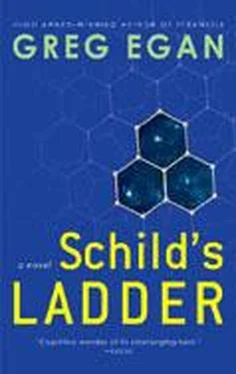
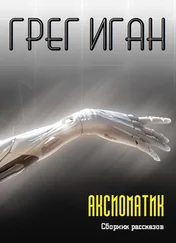
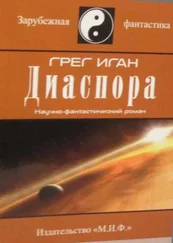


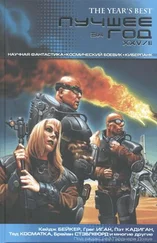



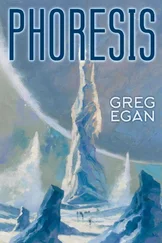
![Грег Иган - Рассказы [компиляция]](/books/419837/greg-igan-rasskazy-kompilyaciya-thumb.webp)
